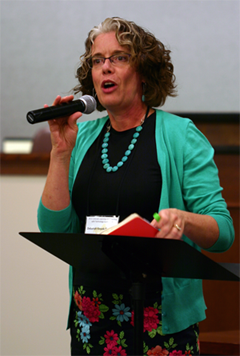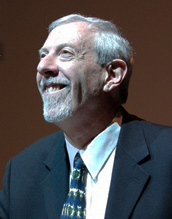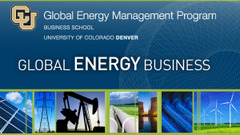CU a leader in MOOC education
Since introducing massive open online courses (MOOCs) through a partnership with Coursera in 2013, the University of Colorado has received national recognition as a leader in MOOC education and kudos from learners across the globe. This fall, CU offered eight courses; courses overall have reached more than 407,000 participants.
Deborah Keyek-Franssen, associate vice president for digital education and engagement, presented at the Coursera Partners Conference in London in March. National and international partners came to learn about effective practices for supporting systemwide MOOC initiatives, she said.
“CU is playing a leadership role in a U.S. State System consortium for Coursera partners,” Keyek-Franssen said. “We have developed a site for those partners to share effective practices. We had a MOOC community-building event called MOOC and Cookies, and now SUNY is implementing one called MOOC Shake. So if imitation is the sincerest form of flattery…”
As of October, Coursera had 10 million users and 839 courses from 114 institutions, she said.
“Across the courses running this fall and physics last spring, CU had 1,197 students taking MOOCs using Coursera’s Signature Track for a verified certificate, which translates into some revenue for CU,” Keyek-Franssen said. Signature Track is a new option that gives students in select classes the opportunity to earn a verified certificate for completing their Coursera course. The fee is between $30 and $100 for each course.
Students from every corner of the globe have spoken highly not only of the course content but of the dynamic CU faculty offering the MOOCs.
“Deciphering Secrets: Unlocking the Manuscripts of Medieval Spain,” taught by Roger Martinez, assistant professor of history at CU Colorado Springs, launched earlier this year and enlisted participants to translate historical documents from Plasencia (1300-1600 c.e.) in western Spain.
More than 10,600 learners from 140 different countries joined the course to study the city’s intercultural history, learn basic paleography skills and assist in the transcription of 600 pages of historical manuscripts.
“Since completing the course, almost 1,000 former students have joined our citizen scholar effort where they will learn more about Plasencia, assist with manuscript interpretation and analysis, and participate in ongoing Internet-based collaboration using Virtual Plasencia,” Martinez said.
Virtual Plasencia is a 3-D walk-through model of a key portion of the 15th century, walled city. The course and the digital version research the lives and relationships of the city’s Jewish, Catholic and Muslim inhabitants, Martinez said.
Also wrapping up its inaugural offering is the popular Mini Med School MOOC, which was hosted on Canvas. The on-site-course-turned-MOOC attracted 4,057 participants in its online debut. The 25-year-old program was initiated by J.J. Cohen, professor of immunology and medicine in the CU School of Medicine (SOM), to fill a need, offering lectures on microbiology and immunology and anatomy and physiology.
“The goals of the program were quite different from the other MOOCs in that ours was based on a free program and had no entry requirements at all; so we had lots of school kids in addition to the older folks,” Cohen said.
William Kuskin, professor and associate vice provost for education innovation at CU-Boulder, was one of the first to dive into MOOCs with his “Comic Books and Graphic Novels” course. His MOOC was one of three in the world to receive special mention from MOOC co-founder Daphne Koller at the London conference. With 39,183 participants ages 13 to 65-plus from 169 countries taking part, it remains highly popular.
Kuskin stressed that the course isn’t all fun and games.
“I teach comics because I endeavor to show that something that appears as entertainment can actually be something to analyze, reflect on and become sharper by thinking about,” he said.
Michael Orlando, GEM lecturer in the Business School at CU Denver, offered the “Fundamentals of Global Energy in Business” MOOC, a course that provided an introduction to the business of primary energy production.
“We examine the nature of demand and supply in global energy markets, and business considerations for participants in those markets,” Orlando said. “We're currently about halfway through Session 2 and I see that over six months after the (Session 1) course closed, we still have about 50 students per week visiting that first course session site.”
Students taking this course identified challenges facing enterprises engaged in development of primary energy resources. The course provided a broad perspective of the challenges for businesses and policy authorities engaged in diverse but integrated global energy markets. The MOOC had 32,764 learners – 76 percent were women – from 190 countries.
New courses are gearing up, including Global Health Responders, being taught by Jay Lemery, associate professor of emergency management at CU Anschutz Medical Campus. Most of the other courses will be repeated or continued.
“MOOCs will play an excellent role in recruiting students to online and on-campus programs; for student outreach or college preparation in K-12,” Keyek-Franssen said. “They will find a niche with professional development and adult education – for instance, membership organizations or licensing boards who require PDH (professional development hours) or CEUs (continuing education units).”
Kuskin said that MOOCs and those who conduct them are just beginning to realize their potential.
“We believe in education, we believe not in passing technologies but in the power of human learning to unleash the human imagination,” Kuskin said. “That is our charge; that is what we have risen to.”
Students have good words about CU MOOCs
Deciphering Secrets: Unlocking the Manuscripts of Medieval Spain, Roger Martinez
“I just wanted to say a big thank you for offering this online course and congratulate you for its successful outcome. I hope more courses like this one are offered on Coursera or other online educational platforms.” ~ Efthymia, Cyprus
“I have a new perspective of the history of my country and also of my own family. I’ve never suspected that Plasencia had been so important in the history of Spain.” ~ Sara, Spain
Mini Med School MOOC (feedback is anonymous)
“The tone and visuals were great, and I liked that the videos dispelled a lot of myths and gave a lot of suggestions for how to live a healthy lifestyle.”
“Greetings from Egypt. I am so happy to be part of this great journey and I am so excited. As I am a pharmacist I need to know more and more about human body.”
Comic Books and Graphic Novels, William Kuskin
“Your engaging performances in the course videos appealed to my heart and mind. So thanks for providing the cyberspace for students, some of whom made inspiring contributions.” ~ Andrew, Switzerland
“I can’t wait to take this course again. Thank you for being such an awesome human being.” ~ Ximena, Mexico
Fundamentals of Global Energy in Business, Michael Orlando
“YES!!! If those three letters don’t convey the message, here is the long one: Prof Orlando has helped me in providing an insight into the global energy industry. As my discipline is electrical power engineering, this course brought me a resourceful knowledge of the industry, which form a solid foundation for my work.” ~ Anggoro, Indonesia
“I am electrical engineer for Japanese company. . . . I’d like to thank you, Professor Orlando, very much for giving me very valuable lecture. I’m sure I’ve learned lots of things for my life.” ~ Toshiaki, Japan






